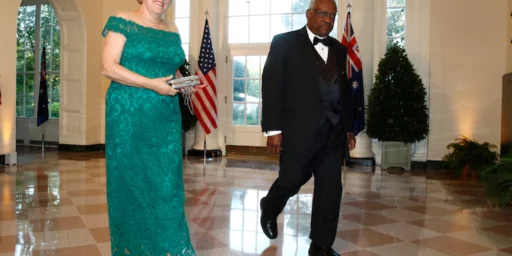Hiring Preferences for Government Spouses
A perfectly reasonable initiative with a significant downside.

There is a move afoot to make it easier for spouses of Foreign Service Officers to get preferences in government hiring similar to those now enjoyed by those married to members of the armed forces. While well-intentioned, there are obvious drawbacks.
A bipartisan pair of senators is looking to ease the process for family members of Foreign Service officers to receive federal jobs, saying the measure would help the government recruit top-notch candidates for its career diplomatic corps.
The Foreign Service Families Act would enable the State Department to use expedited hiring authority for family members of Foreign Service officers overseas, much like the Defense Department does for military spouses. Foreign Service spouses would also receive notification of State vacancies and the department would build hiring preferences for them into contracts with private businesses. The bill would require State to expand telework opportunities so diplomat spouses could keep their jobs while traveling to new posts with their families.
Government Executive, “Bipartisan Bill Would Expand Federal Job Opportunities for Foreign Service Spouses“
What’s behind this initiative?
Sen. Chris Van Hollen, D-Md., said he introduced the bill due to his first-hand experiences growing up in a Foreign Service family, noting his mother was provided few opportunities when traveling to posts with her husband.
“These families often face unique challenges,” Van Hollen said. “This legislation will help provide more employment opportunities to Foreign Service spouses, and ensure that we can continue to attract and retain the best and the brightest to serve in our diplomatic corps.”
So . . . we’re basing this on the idiosyncratic experiences of one Senator’s childhood? And that Senator is . . . 60 years old? Could things maybe have changed a bit in the ensuing 40-odd years?
The American Foreign Service Association praised the intentions of the bill, saying its member families “frequent deployment abroad, often in difficult and even dangerous conditions.” The group said it welcomed a “high-level conversation” about the authorities and resources necessary to support those sacrifices.
Sen. Dan Sullivan, R-Alaska, who cosponsored the bill as it was unveiled last week to coincide with Foreign Service Day, said the measure would bring equity between military and civilian personnel serving overseas.
“Foreign service professionals are every bit as patriotic and service-oriented as members of our military, and often face similar challenges in far corners of the globe,” Sullivan said. “We can’t forget that their family members serve our country too and, as a result, find it difficult to secure employment opportunities of their own.”
The equity argument is reasonable. While there are differences in scope and scale between the military and foreign service lifestyle, frequent moves, including the expectation of repeated overseas assignments, are a feature of both.
Details on what the legislation would do are scant:
The bill would also seek to expand private sector job opportunities for Foreign Service family members by making space at State facilities for outside groups to provide career services and by “developing partnerships” for private companies.
It was understood even in my day as a young military officer–thirty years ago—that frequent travel wreaked havoc on the career of spouses. Indeed, mine was the first generation where it was simply expected that most spouses of officers would have careers of their own rather than keep the fires burning on the home front and provide unpaid support for the families of junior personnel.
Three decades later, we really haven’t solved the problem. And that’s even though we’ve long understood that it has spillover effects on retention and family cohesion. Spouses simply aren’t willing to sacrifice their own careers in the way they once did; nor should they be expected to.
Hiring preferences within the civil service and contractor sectors are an obvious way the government can help alleviate these pressures. But, of course, they’re only effective to the extent that they’re significant. And, to the extent they’re significant, it means that we’re hiring people who would otherwise be substantially less competitive.
Many rightly complain that preferences for veterans and, especially, veterans with service-connected disabilities make it challenging for hiring managers to get the right people. They may be forced to hire a minimally-qualified veteran rather than more qualified non-veterans in the pool. Add in the additional advantage of coming with a security clearance and the problem is exacerbated.
Ultimately, I suppose, the question is whether the trade-off is worth it. By definition, hiring preferences mean we’re hiring people hiring managers believe are less qualified than those who would otherwise be hired. That may be a reasonable sacrifice if it helps us retain the best military and foreign service officers.
At least the gender disparities will move in the opposite direction. One additional complaint about veterans’ preferences is that it further skews hiring, particularly in the national security space, male. Preferences for military spouses will, in the same measure, predominantly go to women. The skew is less for FSOs but still there.






“Could things maybe have changed a bit in the ensuing 40-odd years?”
As an FSO with over a decade of service in the Department of State so far, I can assure you that no, not much has changed. Spousal employment options remain generally few and far between, and this remains a significant problem for families in the FS. If mama ain’t happy, ain’t nobody happy.
@James: That makes sense. One presumes there are rules strictly limiting what spouses can do in terms of employment by foreign actors—at least without jeoparding the FSO’s clearance and career.
I just find it amusing when a 60-year-old Senator is inspired to legislate by his childhood experiences. 42 years ago was another era, indeed, for women in the workforce.
Except that if a double-career couple decides to not look at FS jobs at all because of the government indifference towards the trailing spouse.
Seems to me you’re fretting over a theoretical future “drop in competition” if a helping hand is given to the trailing spouse and totally ignoring the very real fact that high-quality double-career couples may have already self-selected out from even applying to the FS, meaning you get zero of either of them. They’re not stupid. They already know that they can apply to other positions in corporations and government agencies who WILL provide assistance in finding employment for the trailing spouse. Why? Because the job market is competitive on the other end as well.
Keeping with the present system isn’t a way of improving the quality of applicants to the FS; it just makes the FS less competitive in its turn.
@grumpy realist:
I’m explicitly not ignoring this issue, I’m just saying that it’s a trade-off.
I know people who have overseas postings in the foreign service and to me this sounds like a godsend. It is highly problematic to have a spouse who has to give up not just their career but any employment at all if there is an overseas posting, since in most countries a work visa is ranges from very hard to impossible to obtain.
Yes, it’s a tradeoff, but I think it skews very heavily in favor of spousal exemptions. You get an employee that you don’t have to relocate (a very expensive endeavor), you don’t have to house (since they are already in the spouse’s allotment), and you have a primary employee who is much less likely to lose productivity due to a spouse’s depression or alcoholism, two very real and very prevalent problems with overseas assignments.
I don’t have experience working in the FSO world except for some of the regional security officers. Based on this limited experience, I’m not sure how much impact this will actually have. It’s not like there are a ton of jobs for American spouses in the majority of embassies which are located in some version of bumfuckistan, much less jobs that can count as a “career.”
And the same problem is still there in the military and will remain as long as there is the PCS (personal change of station) cycle where servicemembers are forced to move every 2-4 years. Many families I know end up geo-bacheloring.
Probably a system could be created where private entities that contract with the government for more than $x of revenue per year have to give some sort of preference to hiring spouses of FSOs.
So much white collar work can be done remotely these days, and without the need to be in the same time zone. And that is the type of career we are almost certainly talking about, since FSOs are college educated, which means that their spouses are statistically likely to also be college educated.
If a contractor is told “In exchange for this $100,000,000 annual contract, you need to find slots for x people,” that seems like a tradeoff they should be willing to make.